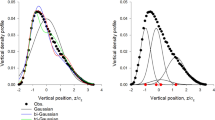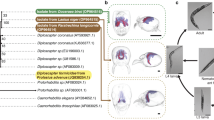Abstract
THE phenomenon of swarming in Tylenchorhynchus species and other nematodes1,2, under investigation for the past three years in Louisiana State University laboratories, has been related experimentally to physiological state, cuticle property and species specificity of plant parasitic and free-living forms.
This is a preview of subscription content, access via your institution
Access options
Subscribe to this journal
Receive 51 print issues and online access
$199.00 per year
only $3.90 per issue
Buy this article
- Purchase on Springer Link
- Instant access to full article PDF
Prices may be subject to local taxes which are calculated during checkout
Similar content being viewed by others
References
Hollis, J. P., Nature, 182, 956 (1958).
Hollis, J. P., Phytopath., 50, 639 (1960).
Fairbairn, D., Exp. Parasitol., 6, 491 (1957).
Steiner, G., Proc. Third Intern. Cong. Microbiol., New York, 434 (1940).
Steiner, G., Proc. Fourteenth Intern. Cong. Zool., Copenhagen, 368 (1956).
Author information
Authors and Affiliations
Rights and permissions
About this article
Cite this article
HOLLIS, J. Nature of Swarming in Nematodes. Nature 193, 798–799 (1962). https://doi.org/10.1038/193798b0
Issue Date:
DOI: https://doi.org/10.1038/193798b0
This article is cited by
-
Phenomenon of Swarming in Nematodes
Nature (1966)
Comments
By submitting a comment you agree to abide by our Terms and Community Guidelines. If you find something abusive or that does not comply with our terms or guidelines please flag it as inappropriate.



